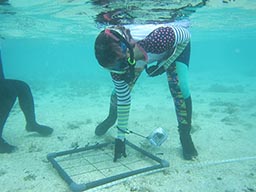- ABOUT US
- PROGRAM AREAS
- CONSERVATION APPROACH
- EDUCATION
- MULTIMEDIA
Kara Chuang: A Coral Reef Conservation Program 2025 Knauss Fellow

In February 2025, we welcomed one of two 2025 Knauss fellows to the NOAA Coral Reef Conservation Program (CRCP) office: Kara Chuang. Kara is supported by Maine Sea Grant and received her M.S. in Marine Biology from the University of Maine in August of 2024.
After receiving her undergraduate degree from UC Berkeley in 2020, she joined an aquaculture technologies start-up– an opportunity which led her to trade the palm trees of California for the palm trees of Hawai'i Island, a notable hub for emerging aquaculture businesses. In this fast-paced role, she immersed herself in the sustainable seafood industry where she conducted global market research and worked to improve data collection for seafood producers. She gained a more granular perspective of the industry as she worked on-the-ground as a commercial hatchery technician at the nation's only open-ocean offshore aquaculture finfish farm, Blue Ocean Mariculture. Here, she specialized in larval rearing and broodstock husbandry and observed firsthand the need for improved hatchery practices to create a more sustainable farmed seafood industry. This experience inspired her to advance her skills and knowledge base in the seafood industry through a graduate degree. In 2022, she made her longest move yet from Hawai'i to Maine to pursue a master's degree in marine biology at the University of Maine. While in graduate school, her research focused on larval finfish nutrition to improve efficiency and reduce waste in commercial finfish hatcheries. In addition to her studies, she attended a variety of local and national conferences, collaborated with government, industry, and non-profit partners like the U.S. Department of Agriculture and Hubbs-SeaWorld Research Institute, and made a lot (a LOT) of fish food.

Though Kara's academic and career background up to this point has not been reef-related, she brings no shortage of enthusiasm for these marine environments to her position with NOAA CRCP. Her appreciation for coral reef ecosystems began while studying abroad in Australia where she spent many days snorkeling and exploring the Great Barrier Reef. Years later, while living in Hawai'i, she spent her days surfing, snorkeling, and freediving on Kona's pristine reefs, further solidifying her appreciation for and desire to protect these ecosystems. In her free time, she was also a ReefTeach volunteer at Kahalu'u Bay where she educated tourists and visitors on how to respectfully recreate around Kona's coral reefs.

Kara's desire to approach critical issues in marine science from a different perspective was what drove her to apply for the Knauss Marine Policy Fellowship. Becoming a Knauss Fellow was a long-time dream of hers, predating even her desire to go to graduate school, and to have been selected for this year's fellowship is a privilege and an honor. The Knauss Fellowship seemed like an invaluable experience and an opportunity to interface with policy, management, and for the unique networking experiences that Knauss fellows are provided. She views this fellowship as a chance to challenge herself, push her limits, become more adaptable, and develop a breadth of new skills. Kara will support the U.S. Coral Reef Task Force (USCRTF) and supporting working groups in planning their 50th meeting in Washington, D.C. in May, as well as their 51st jurisdictional meeting in Puerto Rico this fall. Currently, she is working on updating programmatic environmental compliance documents for the Coral Reef Conservation Program, developing communications products for the USCRTF Watershed Working Group, and spreading the word about CRCP's mission through their social media channels. She is thrilled to come to work every day and hopes to make meaningful contributions to the NOAA Coral Reef Conservation Program office during her time here.
Related Stories and Products
About Us

The NOAA Coral Reef Conservation Program was established in 2000 by the Coral Reef Conservation Act. Headquartered in Silver Spring, Maryland, the program is part of NOAA's Office for Coastal Management.

The Coral Reef Information System (CoRIS) is the program's information portal that provides access to NOAA coral reef data and products.
Work With US
U.S. Coral Reef Task Force
Funding Opportunities
Employment
Fellowship Program
Contracting Assistance
Graphic Identifier
Featured Stories Archive

Access the archive of featured stories here...
Feedback
Thank you for visiting NOAA’s Coral Reef Conservation Program online. Please take our website satisfaction survey. We welcome your ideas, comments, and feedback. Questions? Email coralreef@noaa.gov.
Stay Connected
Contact Us
NOAA’s Coral Reef Conservation Program
SSMC4, 10th Floor
1305 East West Highway
Silver Spring, MD 20910
coralreef@noaa.gov
